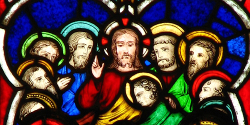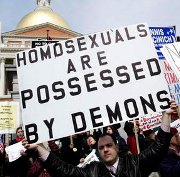









I have my share of concerns about the way some Christians view marriage and whether or not those views are really biblical, but that’s not what this blog post is about. Vorjack over at “Unreasonable Faith” has challenged the familiar appeal that Christians sometimes make to “biblical marriage” in their rejection of same-sex unions. He claims that this appeal is defective because marriage doesn’t just mean one thing in the Bible, it means eight different things. He writes,
Here’s a summary:
1. Polygynous Marriage
Probably the most common form of marriage in the bible, it is where a man has more than one wife.
2. Levirate Marriage
When a woman was widowed without a son, it became the responsibility of the brother-in-law or a close male relative to take her in and impregnate her. If the resulting child was a son, he would be considered the heir of her late husband. See Ruth, and the story of Onan (Gen. 38:6-10).
3. A man, a woman and her property — a female slave
The famous “handmaiden” sketch, as preformed by Abraham (Gen. 16:1-6) and Jacob (Gen. 30:4-5).
4. A man, one or more wives, and some concubines
The definition of a concubine varies from culture to culture, but they tended to be live-in mistresses. Concubines were tied to their “husband,” but had a lower status than a wife. Their children were not usually heirs, so they were safe outlets for sex without risking the line of succession. To see how badly a concubine could be treated, see the famous story of the Levite and his concubine (Judges 19:1-30).
5. A male soldier and a female prisoner of war
Women could be taken as booty from a successful campaign and forced to become wives or concubines. Deuteronomy 21:11-14 describes the process.
6. A male rapist and his victim
Deuteronomy 22:28-29 describes how an unmarried woman who had been raped must marry her attacker.
7. A male and female slave
A female slave could be married to a male slave without consent, presumably to produce more slaves.
and of course …
8. Monogamous, heterosexual marriage
What you might think of as the standard form of marriage, provided you think of arranged marriages as the standard. Also remember that inter-faith or cross-ethnic marriage were forbidden for large chunks of biblical history.
The important thing to realize here is that none of these models are described as better than any other. All appear to have been accepted.
So there you go. The next time someone says that we need to stick with biblical marriage in this country, you can ask them which of the eight kinds they would prefer, and why.
Someone who’s unwilling to be a cheerleader for scepticism but who actually a) knows enough to know whether or not the claims being made align with the facts and b) recognises poor reasoning when they see it, isn’t going to be impressed by this. But the reality is, material like this more often than not appears on websites or blogs where the visitors are likely to be visitors to the site because of their hostility to Christianity, and will be gleefully received as ammunition without much effort being taken to check its reliability. I’m sure similar things happen at some Christian websites too. I should say, too, that it is possible that Vorjack isn’t trying to be dishonest. He is merely reproducing material from another source – albeit with some additions of his own. I doubt that he is deliberately lying. I still say, however, that when you’re in a position to produce material to a large audience and peddle it as fact, you have a responsibility to exercise some care. This certainly wasn’t done in this case.
OK, here we go. This is the short version of what I found objectionable about the claims posted:
Read More





 With the furore over same-sex marriage gaining steam both in the United States and in New Zealand, where the issue is about to be debated in Parliament, I thought I should say a few things about that recent study that’s got some people upset – The study that said the things that we are all supposed to just know aren’t right and, more importantly, shouldn’t be said, that (stated in very general terms) children do better when they have, in their home life, a man who is their father and a woman who is their mother (as opposed to only one parent or parents of the same sex).
With the furore over same-sex marriage gaining steam both in the United States and in New Zealand, where the issue is about to be debated in Parliament, I thought I should say a few things about that recent study that’s got some people upset – The study that said the things that we are all supposed to just know aren’t right and, more importantly, shouldn’t be said, that (stated in very general terms) children do better when they have, in their home life, a man who is their father and a woman who is their mother (as opposed to only one parent or parents of the same sex).
